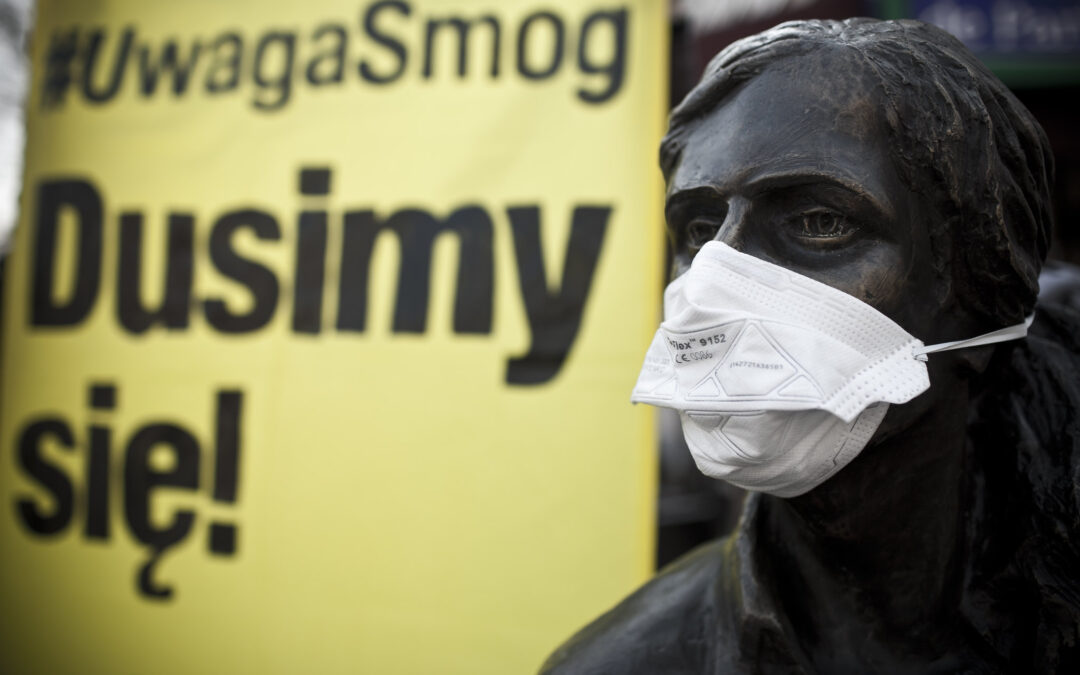Orzesze in Poland was the city with Europe’s most polluted air in 2020, according to a report by IQAir, a leading air quality technology company. The city, in Poland’s Silesian coal heartlands, had levels of harmful particulate matter four times higher than the World Health Organisation target level.
However, the report made better reading for Poland overall. The country is regularly found to have the worst air pollution in the European Union, but IQAir notes that its average air quality in 2020 improved significantly on previous years.
At the national level, Poland had the 12th worst air quality among all countries in Europe, and the fifth worst in the EU, ahead of Italy, Greece, Croatia and Bulgaria. Poland’s annual mean of PM2.5 (fine particulate matter) was 16.9, continuing an improvement from 18.7 in 2019 and 22.4 in 2018.
In 2018, Poland had the sixth worst air in Europe and second worst in the EU. The following year, it had improved to have the tenth worst in Europe and fourth in the EU.
In IQAir’s ranking of European cities, Orzesze was found to have the worst air. Its annual mean PM2.5 level of 44.1 put it ahead of the Bosnian capital of Sarajevo and Valjevo in Serbia in second and third place respectively. The WHO’s annual mean PM2.5 target is 10.0.
No other Polish cities were listed among the worst 15 in Europe, which also features cities in Turkey, Kosovo and Italy. In the 2018 ranking, there were three Polish cities among the 15 most polluted.
The IQAir report points out that 2020 brought an “unexpected dip” in air pollution worldwide as a result of the pandemic, and that 2021 would probably bring an increase in air pollution because of renewed activity.
A major factor in Poland’s smog problem is the widespread burning of dirty fuels – including coal, but also sometimes household waste – to heat homes.
Poland therefore suffers particularly in the colder months. The latest IQAir report notes that it is one of the European countries “with a heavier reliance on coal-based energy and biomass burning for heating” with “unhealthy” average air quality in winter.
Although air pollution emissions across Europe have fallen considerably over past decades, this “remains the continent’s greatest environmental health risk”, the report concludes.
How Poland has the EU's worst air pollution and why Poland has the EU's worst air pollution in two charts (via The Economist: https://t.co/i8k5iqpbQc pic.twitter.com/WyLGk2aFfw
— Daniel Tilles (@danieltilles1) January 28, 2021
In November, a report by the EEA identified Poland as having the European Union’s most polluted air. Its data showed that pollution in almost all areas of the country exceed European air standards, and that air pollutants caused nearly 50,000 premature deaths in Poland in 2018.
Earlier in the year, a ranking by the Air Quality Life Index (AQLI) also found Poland to have the most polluted air in Europe. In 2018, the World Health Organisation found that 36 of the EU’s most polluted cities were in Poland.
As awareness of Poland’s air pollution problem has increased in recent years, a number of measures have been taken to tackle it at local and national level.
In 2018 the government launched a “Clean Air” programme – theoretically one of the largest of its kind in Europe – which aimed to reduce smog by providing households with funds to replace old heaters and to improve insulation.
However, the initiative has been marred by poor implementation and resultant low take-up, resulting in the European Commission considering withdrawing funding. The government has since taken steps to make it easier for people to apply for subsidies.
Many cities have also attempted to tackle the problem locally. In 2019, Kraków, previously known as one of Poland’s most polluted cities, become the first to ban the burning of coal and wood in 2019. A new study this year showed that the city’s air quality had improved, although it still sometimes records very high levels of smog.
Main image credit: Agata Kubis/Greenpeace Polska (under CC BY-ND 2.0)

Ben Koschalka is a translator, lecturer, and senior editor at Notes from Poland. Originally from Britain, he has lived in Kraków since 2005.




















